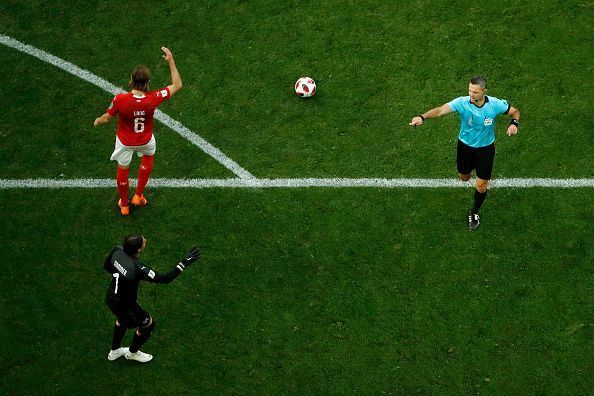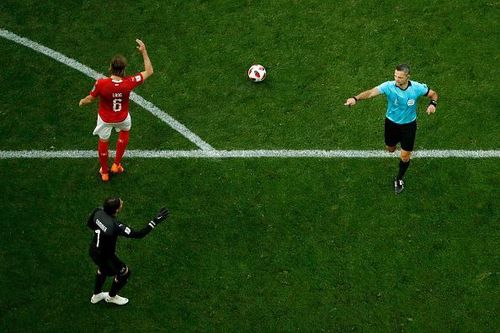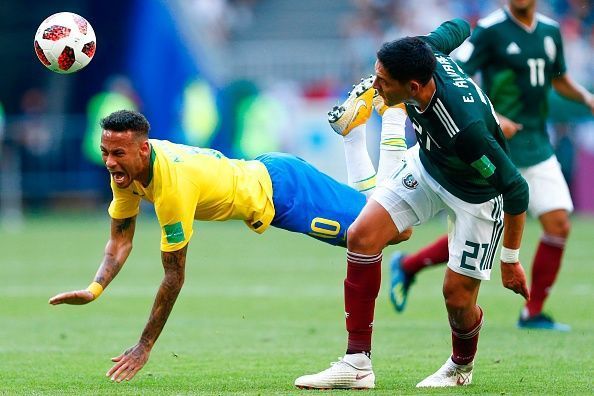
Video Assistant Referee: success or a step too far?

Now I know you’re probably sick and tired of reviews at this summer’s World Cup, but unfortunately, it’s time for another.
Fans have been left with no shortage of talking points so far this year, and almost every subject of contention has been connected by a common thread: Video Assistant Referee.
VAR is the use of video technology designed to assist referees with contentious decisions. After trials last year in the F.A and Carabao cups, the brand new system was officially rolled out at the World Cup this year for its tournament debut. The idea is video assistance will eradicate potentially game-changing errors but, as we approach the competition's climax, has it been a success? Well, the answer is yes and no.
While its introduction has alleviated some of the pressure on the officials, VAR has been largely criticised by fans and pundits, with eyebrows raised over some of the calls made.
Things got off to a shaky start in Russia, with the new system drawing criticism after an incident in one of the tournament’s opening matches. Following France’s first group game, VAR came in for some flak over a controversial decision concerning a challenge on Antoine Greizmann. The referee, who was unsure if the Australia defender making the challenge had managed a touch before taking Greizmann out, consulted his behind-the-scenes team and following some scrutiny at the VAR HQ in Moscow the penalty was given, despite the replay appearing to show the defender making contact with the ball.
After more questionable calls in the Spain Vs. Morocco and Portugal Vs. Iran games, it was fair to say VAR hadn’t gotten off to the triumphant start its advocates had hoped for. Along with some shocking decisions there have been some rather embarrassing moments as well. One incident that springs to mind involve Iran’s Saeid Ezatolahi, who was practically in tears of joy after thinking he’d scored against Spain -- only for the referee to disallow the goal for offside following a review. The right decision was made, but it was still hard not to feel sorry for the red-faced Iranian players whose premature celebrations were awkwardly cut short.
On top of the strange decisions, detractors also argue the frequent stoppages VAR causes interfere with the fluidity of play, removing some of the excitement from the game. There’s no doubt the stop-start nature of the new system feels unusual and it’ll take time for a sport accustomed to decisions being made on the spot to adjust. But while the break up of play is far from ideal, it isn’t a reason to persist with an antiquated system of one referee and two assistants when mistakes can ultimately cost a team its place in a tournament.

A football pitch is an impossibly large surface area for three pairs of eyes to observe with absolute efficiency and considering the modern-day technology at our disposal it’d be foolish not to use it. Sometimes the officials miss things and bad decisions are made – just ask any England fan!
And while there are certainly some creases that need to be ironed out, the irony is that if there’s one thing this World Cup has highlighted, it’s the need for extra support for the officials. Whether it’s the players such as Brazil's Neymar, who are hell-bent on gaining an unfair advantage with their nauseating theatrics, or the set-piece defending we’ve seen that’d look more at home in a UFC cage, it’s clear that in the modern-day game more observation is now necessary.
Moreover, despite the controversial incidents that have muddied VAR’s debut, it’s actually had some real successes. One moment of glory came via South Korea’s first goal against Germany, which was initially ruled offside until a review by the referee established the touch that sent the ball into Kim Young-Gwon’s path actually came from a German player.

Another hit for the new system came in the Colombia Vs. Senegal match. After a Senegal player was brought down, the referee, who initially awarded a penalty, decided to consult a second opinion and after a review, the VAR team quickly overturned the decision as it was established Colombia’s Sanchez had won the ball fairly. The incident came at a crucial time in the game with the score level at 0-0 and had the mistake from the referee not been overruled, the error could’ve completely changed the course of the match, which Colombia eventually won 1-0.
These are great examples of the type of situation video assistance was introduced to clear up, and they prove the system can work effectively if the guidelines are followed properly – which perhaps holds the key to VAR’s overall success. The guidelines state that as well as to review incidents on the request of the referee, the role of the four officials in the control room is to keep an eye out for “clear and obvious” mistakes by the ref, and some of the controversial moments appear to have arisen over the interpretation of “clear and obvious” with questions being asked about whether or not some of the incidents involving VAR fall under that category. However, if the video team can follow the guidelines more closely then we can expect less of this in future.
Although the arrival of VAR has been far from plain-sailing, as football fans we should be lending our support to anything that aims to make the game fairer. Video assistance is a work in progress and, as with all new systems, initial problems are to be expected. We may need to give this new system time to find its feet, but once it overcomes these early teething troubles expect VAR to be a roaring success.